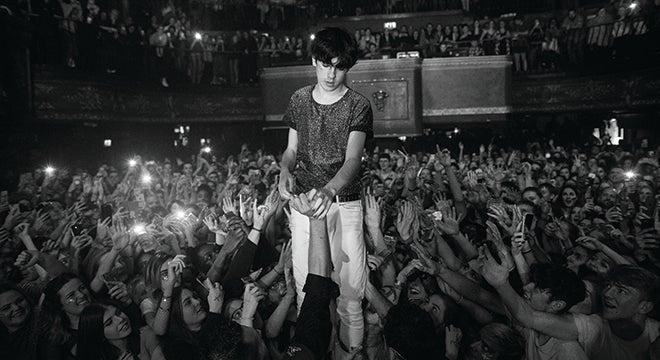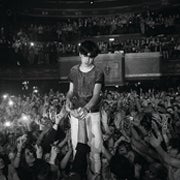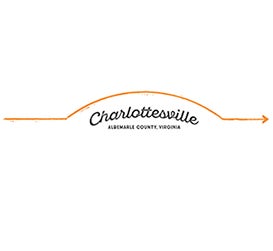
Declan McKenna - *LOW TICKETS*
Declan McKenna - *LOW TICKETS*
with Chappell Roan
Declan McKenna has a problem with authority. For a suburban, Bowie-worshipping 17 year old who dropped out of school to record his debut album and slog round the country in a tour van, that’s hardly surprising. But this waif-like dreamer’s issue with being told what to do extends further than mere rebellion: his songs are gunning for the people who misuse power for the purposes of corruption and oppression. Set to melodies that evoke fond moments of The Strokes and Tom Vek, his messages bite hard.
Written in the summer of 2014 about suspended FIFA President Sepp Blatter and the corruption swirling around that year’s football World Cup, debut single ‘Brazil’ sank its teeth that December. Its brazen sentiment and crisp riffing swiftly alerted the world to McKenna’s presence and kick-started his career.
“People say ‘no one writes songs about Sepp Blatter’,” McKenna says, “But this was based on him, a greedy character who manipulates the environment. It was the first tune I’d recorded properly and the best I’d released… it prompted a shitload of emails.”
A shedload of meetings – mostly conducted at a roadside cafe near his home in Cheshunt, Hertfordshire – followed, and McKenna soon joined The Vaccines and Peace on the books at Columbia and signed to Because in France. Meanwhile, over on his Bandcamp page, Brazil was taking on a life of its own, spurred on by that under-estimated ol’ faithful, ‘word of mouth’. As the stems of a profile were rapidly built, Declan was called for an unlikely appearance on Sky News to talk about what they called his “Anti-FIFA” song. While the presenters bumbled on about his Twitter profile and whether he was old enough to play gigs in pubs, McKenna, dressed in a bandana and Bart Simpson jumper, grinned and outlined how he fills his songs: “With my views and what I want people to talk about. I’ll make that clear.”
In between those management meetings and television appearances, Declan sent off an entry to Glastonbury’s Emerging Talent competition. He consequently won by a length and a half (plaudits from the Eavis’ to add to the expanding fanbase), and having completed his performing commitments on the Friday evening to a full tent of the curious and appreciative, Declan abandoned his family to explore Worthy Farm’s far reaches. He dressed up, got pissed and was offered a threesome. He declined. “It sounds like a cliché but Glastonbury was crazy,” he remembers. Cliched, perhaps, but at 16 years of age it’s a rite of passage.
Declan’s gigs came thicker and faster after Glastonbury and, hankering after a bigger sound, he recruited a guitarist, bassist and drummer. Although he’d always found time to write songs during school, shortly after starting his A-Levels in September he decided to jack studying in. He “did OK” in his GCSEs (four As, two Bs, two Cs and two Ds if you’re asking) but says he “just couldn’t be arsed to be there anymore.”
“All I wanted to do was go home and play guitar,” he continues. Looking at him – he’s wearing a shirt with tiny orange birds printed all over it, an oversized granddad jumper, skintight jeans, mucky Converse and chipped turquoise nail polish – it’s not hard to see why. He looks like a pop misfit in training.
The taste of Brazil’s success was irresistible for a wannabe who first picked up a guitar aged eight and, after immersing himself in Bowie, Jeff Buckley, The Beatles and post-millennial indie from Vampire Weekend to Hot Hot Heat, had home-recorded more than 100 songs by 16. “I once tried to record an album in a day” he recalls, laughing. “It was pretty shit, but I did it”.
Whilst the tail of Brazil had only just reached the US (and continues today to build at a frightening rate on college radio), Declan soon followed it with second single, Paracetamol, which has another evil authority figure (this time based on media misrepresentation of transgender culture) in its crosshairs. Produced by Neil Comber (Django Django, M.I.A., Patrick Wolf) it swaps Brazil’s guitar for a chunky keyboard part, which shrouds even darker subject matter – suicide. Paracetamol was premiered by Declan through his own ‘pirate radio’ station, a weekly (“If I don’t forget, or am not out playing a gig”) digital outlet for Declan to vent and rant, and play his ever-expanding fans his favourite songs and snippets of his own.
Paracetamol is a niggling gem of a song, infectious and straight from the Mac DeMarco school of the leftfield. Blogs were quick to support it, but the repeated suggestion that it was written about a misspent youth was way off.
McKenna, who is straight and has many transgender and LGBT friends, was inspired to write it after trans teenager Leelah Alcorn took her own life in December 2014. “It’s a morbid topic but it’s not meant to be depressing,” he explains. “I’ve heard similar stories about parents who aren’t exactly accepting. Trans culture is too common not to be talked about properly in the media and when it is, like when Channel 4 did Girls To Men, you can tell they don’t even understand what a transgender person is. I wanted to speak as the media, from the bad guy’s perspective and ask why we’re treating people this way.”
By the time he’s finished his fingers are knotted in frustration, but moments later he’s laughing and calling himself the “attention seeking child” of his family. This is symptomatic of his personality. The youngest of six, McKenna is equal parts teenage impishness and righteous indignation, silliness and maturity. He cares deeply about the environment and worries the world is
“somewhat fucked”.
“A lot of my songs are about big world problems because I’ve not got much bad personal stuff to write about. Humans are gonna destroy the planet to the extent they can’t live here anymore and I think we might be around to see that,” he says. Even so, he insists he’s not a crusading songwriter: “Fun is most important. I don’t think I have a responsibility to address anything, it’s good if people start thinking about something because of my songs but I’m not trying to be Billy Bragg.”
Perhaps an easier parallel is Grimes: like Claire Boucher, he has the air of a troubled outsider, chanelling his fears for the future into pop music. McKenna simply says he’s trying to be nothing other than a 17-year-old: “My music isn’t meant to be mature, I’m young. I’ve had comments like ‘D’you reckon he’ll be as good when he turns into a man?’ As if huge balls will suddenly drop through my trousers! I don’t worry about that.”
Mature or not, McKenna is hitting the road and working on his as-yet-untitled debut. Further heavy subject matter (‘Isombard’ tackles police brutality and is inspired by Martin Luther King and ‘The Kids Don’t Wanna Come Home’ was written after the Paris terror attacks in November 2015) sits alongside more personal material (‘Why Do You Feel So Down?’ portrays “a manipulative person who’s an absolute dickhead”).
He’s channelling obsessions with Unknown Mortal Orchestra, St. Vincent, Tame Impala and Sufjan Stevens into songs that explore psychedelic noise, pop and shoegaze. James Ford (Arctic Monkeys, Foals, Haim) will join Neil Comber on production duties. “It’s gonna be very much a first album, all over the place with lots of ideas,” McKenna finishes. “I don’t see that as a bad thing, Bowie did it. I’m creating something you couldn’t put in a genre, it’s difficult but I’ve definitely got enough songs.”
It looks like this kid’s gonna be alright.
During early 2015, 16-year-old Chappell Roan found herself in New York City a thousand miles away from her hometown of Willard, MO. She traveled to the Big Apple in order to showcase for multiple major labels. Hailing from a city of just 5,000, she stood at a crossroads.
“It was a crazy moment,” she admits. “I couldn’t believe where I was, but I knew I wanted this. When I sing, I want people to feel every emotion. I hope they get a better understanding of me as a human being and not just as a singer. I want them to know who I am.”
This kind of honesty defines conversations with the songstress as well as her music, eschewing any and all pretense. Playing the piano with passion and penning lyrics about loss, love, and heartbreak, Chappell sings with a world-weary wisdom that belies her 19 years. Think of her as a teenage girl with the mystique and vision of Sia and powerful pipes a la Lana Del Rey, and you’re on the right track...
It’s no surprise that she unassumingly took the first step on this journey while still in grade school. At 12-years-old, the singer and songwriter began taking piano lessons. Devouring records from Fleetwood Mac and Bob Dylan, she taught herself to play by ear. She went from performing in the school choir to winning an eighth grade talent show. Recognizing her ability, mom encouraged her to play around her hometown area. Growing a buzz, her confessional and captivating style began to resonate with listeners everywhere as she posted music online. As that sound caught on, she signed to Atlantic Records even before finishing her junior year of high school.
Her first single “Good Hurt” immediately intoxicates with its darkly blissful pop fused melodies, illuminating her dynamic voice and vivid lyricism.
“It’s hard for me to explain what ‘Good Hurt’ is about. The best way for me to describe it is an addiction to pain. The meaning lies in the song and the video. Watch and listen and they will tell you everything.”
Now, her upcoming major label debut walks a fine line, and that’s why her music instantly resonates. She’s not afraid to tackle taboo subjects head-on.
Ultimately, Chappell’s music stays close to her heart, and it resonates for that very reason. “I’m not trying to be anything I’m not,” she leaves off. “I just want to be seen as a real person.”
Read More
Design VisualSHOWINGS
This event has already occurred.
The Southern
-
Thu, Aug 14, 2025
SKORTS
-
Fri, Aug 15, 2025
Friday Night Mic - Pop Up Show (18+)
-
Fri, Aug 15, 2025
LYAO Stand Up with Corey Ryan Forrester *POSTPONED*
-
Sat, Aug 16, 2025
Cosmic Charlie (Grateful Dead Tribute)






